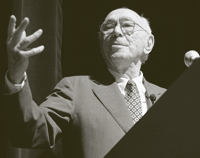Teaching the Possible
Jerome Bruner has encountered many brilliant thinkers during his 90 years - including Jean Piaget, with whom he founded the field of cognitive psychology - but perhaps the greatest influence on his intellectual development was his older sister.
"She was two years older than I was, and a little bit smarter," Bruner told a capacity crowd at Columbia's Alfred Lerner Hall, where he delivered TC's annual Virginia and Leonard Marx Lecture in October. "When I would tell her something, she wouldn't say, 'That's not true,' or 'I don't believe you.' She would say, 'How do you know that?"
Bruner, author of numerous books on cognitive theory, education, and the meaning of culture, and still an active faculty member at the New York University School of Law, has spent his career exploring that question. The answer, he said in a talk titled "Educating a Sense of the Possible," lies in the imagination.
Children are affected by "the inevitable struggle between the conventional and the possible in constructing the world around us," Bruner said. He encouraged educators to "cultivate a sense of make believe in young children so they can first master the part of generating new worlds." Education is not "teaching a fact for its own sake, but for teaching children to go on beyond what is given." It should never become "just a transmission of what we know, without a sense of what is possible."
Human history confirms the importance of that approach, Bruner said, citing as an example the passage of the 19th Amendment to the
TC Professor Jeanne Brooks-Gunn, who delivered introductory remarks, said that Bruner himself has inspired a few such historic shifts in thinking. "There was a time when it was unconventional, even provocative, to say that every child could be reached," said Brooks-Gunn, the
Published Wednesday, Nov. 9, 2005
